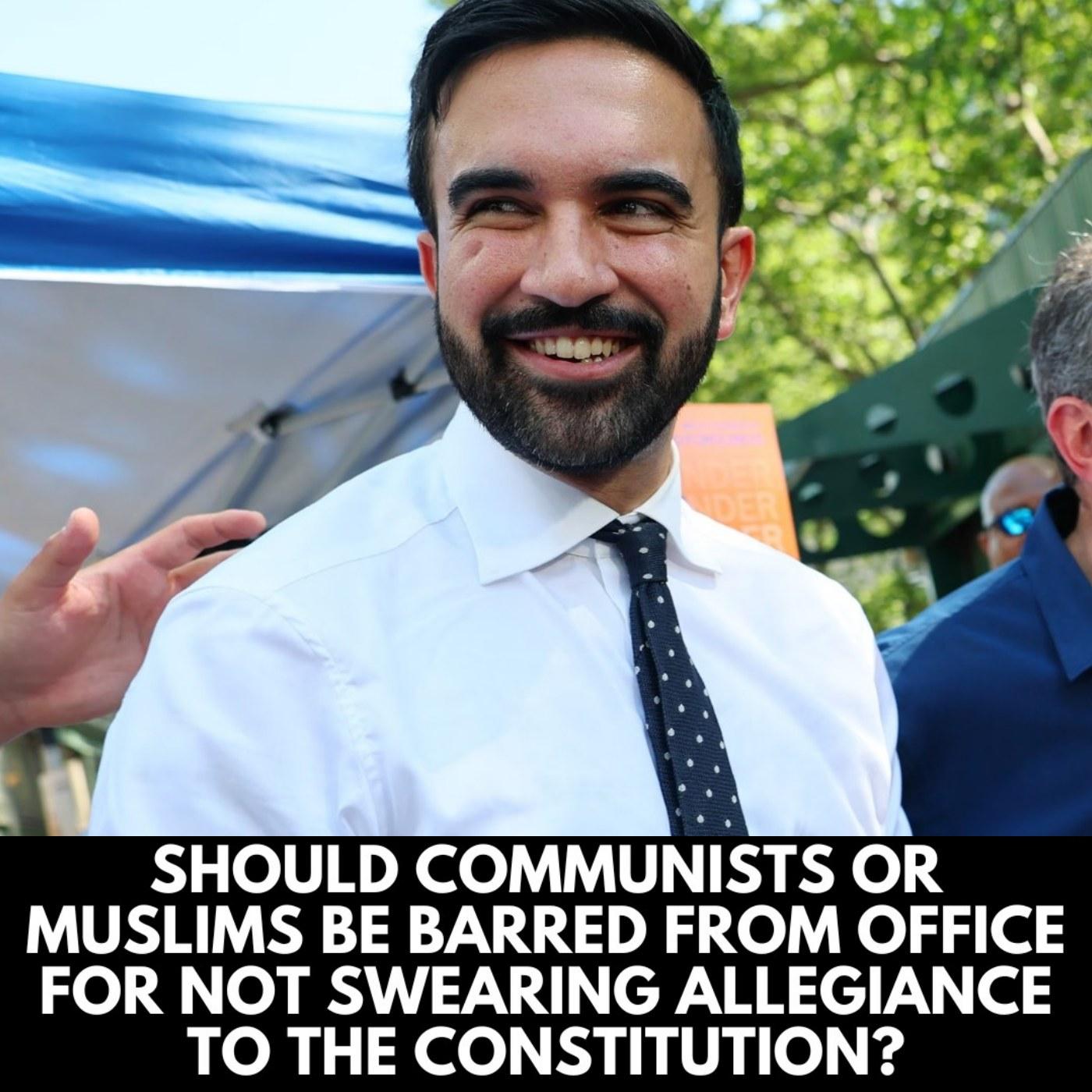
The image above asks a deeply provocative and emotionally charged question: Should communists or Muslims be barred from holding public office if they refuse to swear allegiance to the Constitution? On the surface, it may appear to be a national security concern. But at its core, the question exposes a deeper tension within American democracy—how do we protect our values while upholding the freedoms that define us?
This conversation is not just about law—it’s about identity, religious liberty, political freedom, and the boundaries of democratic inclusion. In an era where polarization is rampant and suspicion can too easily overshadow truth, exploring this issue thoughtfully is not only necessary, it is vital.
The Constitutional Oath Is Mandatory—But Universally Inclusive
Article VI, Clause 3 of the U.S. Constitution clearly states that all federal and state officials must take an oath or affirmation to support the Constitution. This is a requirement designed to ensure that those in public office are committed to upholding the nation’s founding principles.
However, it is equally important to recognize what the Constitution does not allow: it explicitly forbids religious discrimination. The very same clause affirms:
“No religious Test shall ever be required as a Qualification to any Office or public Trust under the United States.”
This is not a vague suggestion—it is a constitutional guarantee. Being a Muslim, a Christian, an atheist, or a person of any belief cannot and must not be used as a barrier to public service, as long as the individual is willing to uphold the laws of the land.
The Peril of Linking Religion or Ideology with Disloyalty
To presume that Muslims or communists are inherently disloyal to the Constitution is not only inaccurate—it is dangerous. It mirrors the same kind of discriminatory logic used during dark chapters of American history, such as the Red Scare or post-9/11 backlash against Muslim Americans.
Many Muslim Americans have proudly served in Congress, the military, law enforcement, and public service. Leaders such as Rep. Ilhan Omar and Rep. André Carson have taken their oaths seriously while practicing their religion with dignity and respect for democratic values. Their records stand as living proof that faith and patriotism are not mutually exclusive.
A History Worth Remembering: McCarthyism and the Red Scare
We must not forget what happens when fear overrides civil liberties. During the Cold War, anti-communist hysteria gripped the United States in what came to be known as McCarthyism. Innocent Americans were accused of disloyalty, blacklisted, and stripped of their careers and reputations—all based on political suspicion rather than evidence.
The lessons of McCarthyism are clear: when the government begins to judge citizens by belief rather than behavior, democracy begins to erode.
What Does the Oath to the Constitution Really Mean?
Swearing allegiance to the Constitution does not mean swearing allegiance to a political party, religious doctrine, or cultural majority. It means promising to uphold a system of checks and balances, the rule of law, individual rights, and democratic processes.
This oath is broad enough to include Americans of all faiths, ideologies, and identities. In fact, it is the diversity of belief that the Constitution protects—not punishes. From libertarians to progressives to religious conservatives, all elected officials must work within the same constitutional framework.
When Belief Conflicts with Public Duty
Yes, there are legitimate concerns about individuals who may seek to subvert constitutional democracy from within. But these are matters to be addressed on a case-by-case basis. If a politician actively incites violence, promotes sedition, or refuses to uphold the constitutional rights of others, legal remedies and oversight mechanisms already exist.
Blanket disqualifications based on group identity, however, are unconstitutional and morally indefensible.
Religious Liberty Is a Bedrock of American Identity
The United States was built, in part, by individuals fleeing religious persecution. Religious liberty is not a footnote of American history—it is a pillar. The First Amendment guarantees freedom of religion, and it applies equally to Muslims, Christians, Jews, Hindus, Buddhists, atheists, and everyone in between.
To exclude Muslims from office based on assumed disloyalty would be to trample the very freedom America claims to protect. It would also alienate a large, patriotic, and diverse segment of the population who wish to serve their country with honor.
The Role of Responsible Public Discourse
The image’s question, while striking, must be handled responsibly. Provocative rhetoric may generate attention, but it can also deepen divisions and spread misunderstanding. Leaders, media, and citizens alike have a duty to approach such conversations with integrity, nuance, and constitutional awareness.
Public trust is strengthened not by silencing voices, but by defending rights—especially the rights of those we may disagree with.
What Really Matters in Public Office
Rather than asking whether someone is Muslim or communist, the more relevant questions are:
Do they respect democratic institutions?
Will they faithfully uphold the Constitution?
Are they committed to serving all constituents equally, regardless of race, faith, or ideology?
These are the questions that protect democracy. Judging people on their beliefs rather than their behavior only serves to divide, distract, and dilute the true purpose of public office: service to all.
Conclusion: Patriotism Is Measured by Actions, Not Labels
To bar Muslims or communists—or any group—from public office simply based on perceived associations would be a betrayal of American ideals. Allegiance to the Constitution is essential for public service, but using it as a weapon for religious or ideological exclusion undermines its very essence.
In a pluralistic society, strength is found not in uniformity but in unity. The true test of patriotism lies in one’s actions, their defense of constitutional principles, and their service to all Americans—regardless of creed or color.
Let us not repeat the mistakes of the past. Instead, let us uphold the highest ideals of liberty, equality, and justice by ensuring that public office remains open to all who are willing to defend the Constitution and serve with honor.




